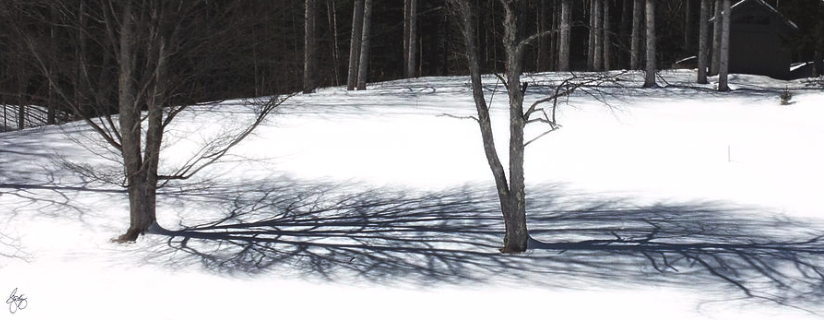By Wayne D. King, View from Rattlesnake Ridge
The third major snowstorm of the winter hit us hard in the shadow of
Rattlesnake Ridge, dropping more than a foot of new snow Christmas day
on top of several feet that had already fallen in December.
No one was happier about that than my neighbor Alan Hunter who over the years has
built a network of ski trails around the base of Stinson Mountain
where he, and a group of his friends, ski almost every day in the
winter . . . No one, except maybe Kevin Maas.
Where he lives in Dorchester, Kevin bought himself an old rope tow
from a fellow who had it sitting in his barn for decades since a local
ski area had gone defunct. Kevin is a fellow who just can’t resist a
challenge, mechanical. He was the first person in the region to take
an old diesel car and convert it to run on veggie oil that he gathered
from local pizza parlors and Chinese restaurants. When he taught our
son Zach how to do the veggie car conversion, he was kind enough to
give him a few restaurants for the needed supply of “grease” and at 15
years old Zach converted a big old red Chevy Blazer he had purchased
on Craigslist from a former Fire Chief on Long Island. Other than the
grease slick in our basement and myriad plastic jugs scattered around
the woods by bears who found Zach’s near-empty jugs too yummy to
resist, the experience was on the whole, most satisfactory.
Kevin is also a wakeboarder. During the summer he and a group of his
friends, including Micky Lewis – our plow guy – Zach when he’s home,
and other friends go wakeboarding on Stinson Lake until late summer.
This year though Kevin fixed up a water heating system that took
advantage of the fact that the engine in his boat cycles water through
the engine to cool it. He added a line that the intrepid wake boarders
would put down the front of their wetsuits and heat up the layer of
water between their bodies and the wetsuit. This let Kevin and his
group of merry men and women wakeboard well into November; whereupon
he gave up the lake and turned his attention to the rope tow. He began
readying it for winter including cutting some glades in his woods to
allow snow boarders and skiers to make their way down the hill behind
his house after ascending it via rope tow powered by an old engine he
had taken from a car that no longer required its service.
By now you are probably starting to wonder how I’m going to make this
column transition into politics but fear not, there’s a method to my
madness. You see, we radical centrists are drawn to those who get
things done . . . people who, in the face of ideologues and other
extremists, persist.
There is a lot of talk lately about how 2018 is going to see a
dramatic shift in the fortunes of both Republicans and Democrats . . .
maybe so. But if that shift is nothing but to have one group of
ideologues replace another we will be no farther along on our new
American journey than we are today and the divisions that plague our
country will be just as stark. However, there is a third way and the
model for it can be found in our own New Hampshire Senate, albeit some
25 years ago. It affords an example for every legislature that is
closely divided or where people of good will in both parties are
willing to challenge the established dogmas to create meritocracies
where what you know is more important than who you know . . . where
allegiance is to country and state, not to political party.
In 1992 the NH Senate elections left the body divided 13 to 11 with
the Republicans holding a slight advantage. In the typical spoils
system that has afflicted us all too often, this would usually have
resulted in the election of a Senate President and the Senate
leadership from the majority party. Likewise all committee chairs
would also be of the majority party, no matter how little they knew of
their assigned committee’s responsibilities.
Just after the election then State Senator Jeanne Shaheen and I, two
Democrats, along with Concord’s beloved Senator Susan McLane and Ralph
Hough of Lebanon, two Republicans, met quietly in Madbury to craft a
bold plan: To create a Senate where party took a second seat to merit
and where Democrats and Republicans worked together for the good of
the state.
I honestly don’t remember who contacted whom with the idea and it
doesn’t matter. Senator Hough had a reputation as a moderate to
progressive Republican whose political hero was Teddy Roosevelt, Susan
McLane was a progressive Republican, undeterred by the slings and
arrows from the far right within her own party. Both represented the
great historic tradition of pragmatic Republicans in the mold of
Warren Rudman, Perkins Bass, Sherman Adams and Charlie Bass.
Senator Hough we surmised would not have won an election among
Republican partisans, but if the 11 Democrats held together, along
with at least 2 Republicans he could win. Ultimately, that is just
what happened; but on that day in Madbury we asked ourselves the more
fundamental questions. How would we create a legislative body where
people worked together; where Chairs and Vice Chairs were chosen for
their expertise and their leadership ability; where fairness,
transparency and achievement were the rule and not the exception?
At first we toyed with the idea of dividing everything equally between
Republicans and Democrats, but that just seemed to be the same old
wine in a different bottle. We decided that parity would be considered
a value but not the be-all-and-end-all. We obviously needed to have a
Senate President as a presiding officer but what required us to have
vice presidents, or other titles that established some kind of formal
or informal pecking order within the Senate? So in our brainstorming –
and later after Senator Hough had won, we did away with all these
titles.
Since the goal was to create an atmosphere where Republicans and
Democrats worked together for the common good developing consensus
where possible and respecting differences where matters of personal
principle made consensus impossible, we considered completely
eliminating the separate pre-session caucuses, an age old tradition
that generally has been a partisan planning session. Senator Hough
felt that he did not want to issue an edict preventing either party
from gathering together when they felt it was important. Instead he
announced that the entire Senate would be invited to lunch together
before the session, in effect creating a bi-partisan caucus where we
would have a final opportunity to develop consensus on contentious
issues and if consensus were not possible to civilly alert one another
that we were going to have a “floor fight.”
It was at these lunches that I developed a real and abiding respect
for many of the Senators whom I had previously seen in a very
adversarial way. Suddenly Senators, whom I had viewed only as
adversaries, were no longer political enemies but colleagues with whom
I often disagreed but who were human beings with whom I could break
bread, talk, and, from time to time, compromise.
Senator Hough began the Senate term with a team building retreat for
the entire Senate challenging us all to move beyond the constraints of
party and to take risks for the good of our state. The retreat
included not only Senators but staff members as well.
That year, as the country struggled to get its economy moving again
the New Hampshire Senate – with a full sponsorship of both Republicans
and Democrats passed five omnibus economic development bills creating
an Office of International Trade; supported the creation of The Center
for Earth, Oceans and Space at UNH, expanded the Port of New
Hampshire, strengthened the Business Finance Authority, took the first
steps toward development of a Community College system throughout NH
among other things, all while balancing the State’s budget
By the end of the two-year term I considered many of my former
adversaries among the finest, most principled people with whom I had
ever served. They had not changed. The dynamic had.
In years past, legislators had opportunities to experience one another
as human beings, whether it was because they would gather together at
the Highway Hotel for dinner or because they carpooled to legislative
sessions. Today it is harder to find such opportunities but with some
effort this small group of Senators upended years of partisan
tradition to create what I believe was the most collegiate and
cooperative group of Senators that I had seen in all my 12 years in
the NH House and Senate.
I will never forget what Ralph Hough said at the end of one of our
early meetings. “They will probably throw us all out for this, but it
will be worth the ride.”
I won’t represent that we changed the face of politics in New
Hampshire – we didn’t. In the next election Republicans dominated the
election and the Senate returned to business as usual, more partisan
than ever. It may have been the same if Democrats had dominated. But
for one brief, shining moment, we glimpsed how things might be if
change were built from the center out.
I hope that Ralph Hough still thinks it was worth the ride. I know I do.
—

Former state Sen. Wayne King of Rumney has written ‘Sacred Trust,’ a fictionalized account of a battle to stop a powerline project. He is pictured with his dogs Anni and Boof.
The Hon. Wayne D. King
787 Stinson Lake Rd.
PO Box 500
Rumney, NH 03266
*http://bit.ly/WayneDKing* <http://bit.ly/WayneDKing>
*NEW!*
*Sacred Trust, a Novel*
“The Monkey Wrench Gang Meets the Third Industrial Revolution”
Available from Amazon Kindle: http://bit.ly/STrust





